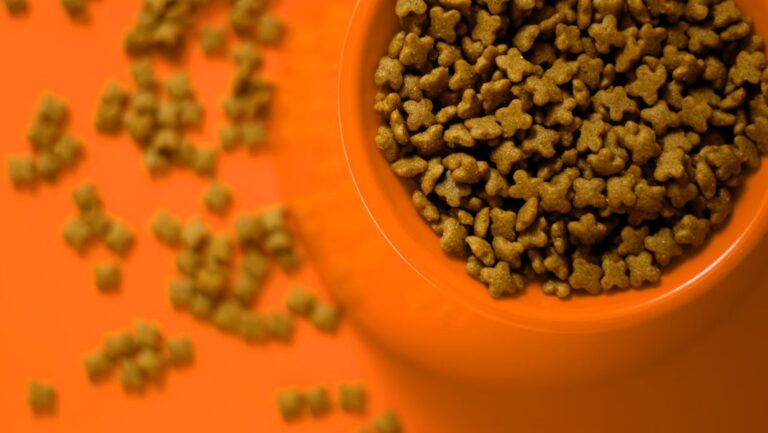Last Updated on September 5, 2024 by maria_isabel_2
Like us, our furry friends also need a balanced diet, rich in vitamins and minerals to keep their coats shiny and tails wagging.
Sometimes, it’s hard to tell if they’re getting enough nutritional support or if the dog food you’re feeding them is correct. We know that a comprehensive diet entails proteins, fats, and carbohydrates. Making sure they’re sufficiently hydrated is just as important.
In this article, we’ll discuss how to maintain a healthy, balanced diet for your dog with a little help from veterinary nutritionists.
The Pet Food Market
The pet food industry is currently experiencing exponential growth. Influenced by higher pet ownership and the demand for quality specialized pet food, the market is fast adapting to customers’ needs.
According to Market.us Media, the global pet food market revenue is predicted to reach $186.10 billion by 2028. Because the U.S. is a pet-loving nation, pet food sales tallied $133.9 billion in 2023.
With countless options to choose from, it can be overwhelming to make the right choice. Previously, it was chicken or beef. These days, it’s a combination of salmon, turkey, and other gourmet-inspired brands.
How to Choose the Right Dog Food
Whether you’re buying a new brand or sticking to a trusted favorite, Medivet suggests always reading the ingredients list. As a general rule, protein should be the first ingredient as it’s the most important nutrient your pet needs.
Stay away from food labels that use vague terms such as “animal derivative” or “cereals” that are high up on the list. It should be a red flag that the dog food is of low quality.
The American Kennel Club adds that good quality dog food should be a valuable source of non-meat ingredients as well such as grains and vegetables.
Keep in mind that puppies and larger dogs have different dietary requirements. If you are unsure of which stage of dog food to feed your pet, consult your vet.
Ethically-Sourced Dog Food
Many pet owners are becoming more aware of what their fur babies digest. Dogs, too, can be adversely affected by toxic pesticides, which have been linked to digestive problems.
The Pet Poison Helpline says pets exposed to insecticides can display signs of drooling, nausea, vomiting, and diarrhea.
To circumvent the chances of pesticide poisoning, you should consider wholesome and healthy dog food with ethically sourced ingredients. Because sustainable dog food contains much less additives and preservatives, it’s easier to digest.
Dry Versus Wet Dog Food
For kibble (dry food) to be considered a sufficient source of nutrients, it needs to meet the standards of the Association of American Feed Control Officials (AAFCO). All brands must list the purpose of the ingredients and meet the portion requirements.
Some pet owners prefer dry food over their wet counterparts simply because it is a convenient, cheaper choice. That doesn’t mean the food is of a lesser quality. The difference between dry and wet food ultimately comes down to how they are processed.
Feeding your fur baby dry food aids in dental health. Kibble encourages your dog to chew their food, which prevents tartar buildup and secondary periodontal disease.
On the other hand, most options in wet food for dogs have a higher moisture content. It’s a better choice if your pet doesn’t drink enough water, especially if they have a history of urinary or kidney disease.
Canned food is also easier to chew and more palatable. If your pooch has a dental disease, it is best that you feed them wet food. And unlike dry food, there are different varieties.
Brands are catering for all dietary requirements and dog breeds. Open Farm recommends choosing wet dog food made with ethically sourced meat to give them the moisture they need.
What Not to Feed Your Dog
Some dogs love eating fruit, but pet nutritional experts agree that they aren’t very rich in nutrition and should be given in moderation.
Veterinary surgeon Dr Terry Fossum tells Pure Wow that pet parents should avoid feeding puppies any sort of canned fruit or fruit snacks. These processed products have sugars and sweeteners that can do major damage to your doggy’s digestive system.
And now, onto that ever-present question, “Can my dog eat chocolate?” Veterinarian Dr Catherine Bartnette says, “No.” The sweet treat contains caffeine and theobromine that affect a dog’s nervous system, cardiovascular system, and kidneys. When given in large quantities, it can be fatal.
At the end of the day, VCA Animal Hospitals advises that you should make your decision based on your lifestyle, preferences, budget, and your dog’s dietary requirements.
Remember, as long as Fido is happy and healthy, you’re making the right food choices for him.






